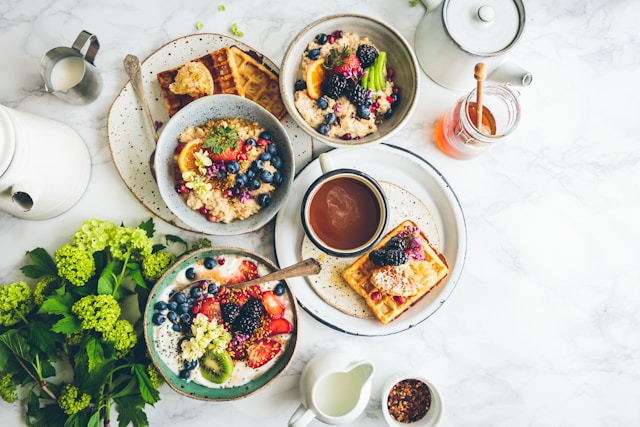
The idea of eating your way to a sharper mind might sound too good to be true, but the connection between diet and brain health is no myth.
While no food can magically turn you into a genius, certain nutrients can support brain function, memory, and even mood.
In this blog, we’ll explore whether brain foods can truly make you smarter and dive into the science behind nutrition and cognitive health.
The Role of Nutrition in Brain Health
Your brain is a powerhouse that requires a steady supply of fuel to function. This “fuel” comes from the foods you eat.
According to research published in Frontiers in Psychology, the brain consumes about 20% of the body’s energy despite only accounting for roughly 2% of total body weight.
The right nutrients can enhance focus, memory, and even long-term brain health.
Conversely, poor dietary choices may contribute to cognitive decline and increased risk of conditions like Alzheimer’s disease.

Key Nutrients That Support Brain Function
Let’s break down the essential nutrients that your brain needs to thrive:
Omega-3 fatty acids
Omega-3s are vital for brain health, particularly DHA (docosahexaenoic acid), which makes up a significant portion of the brain’s gray matter.
These healthy fats are linked to improved memory, reduced inflammation, and even lower risks of cognitive decline.
Research: A study in Neurology found that higher omega-3 levels are associated with larger brain volumes in old age, indicating better brain health.
Antioxidants
Antioxidants combat oxidative stress, which can damage brain cells over time.
These include vitamins like C and E, as well as plant compounds like flavonoids and polyphenols.
How they help: Antioxidants neutralize free radicals, supporting long-term brain health and potentially slowing age-related decline.
Vitamins and minerals
- B Vitamins: B6, B12, and folate are crucial for maintaining brain function and producing neurotransmitters.
- Vitamin E: Acts as a powerful antioxidant to protect brain cells.
- Iron: Essential for delivering oxygen to the brain, ensuring optimal performance.
How These Nutrients Improve Cognitive Performance
These nutrients don’t just keep your brain healthy—they actively enhance cognitive abilities.
For example:
- Omega-3s help build and maintain cell membranes in the brain, facilitating better communication between neurons.
- Antioxidants protect against mental fatigue and memory loss.
- B vitamins support energy production, which the brain needs to maintain focus and clarity.

Brain-Boosting Foods
If you want to support your brain health, certain foods are especially beneficial.
Let’s dive into some of the best options and how they help your brain thrive.
Fatty fish: Salmon, Mackerel, Tuna
Fatty fish are loaded with DHA and EPA, two powerful types of omega-3 fatty acids.
These nutrients are crucial for brain health, particularly for improving learning, memory, and emotional well-being.
- Why it’s important: Omega-3s are a key part of brain cell membranes, and they help reduce inflammation that can affect cognitive function.
- Fun fact: A study published in PLOS One found that people who ate fish regularly had larger amounts of gray matter in brain regions linked to memory and emotions. Essentially, fish lovers may have healthier, better-functioning brains.
Berries: Blueberries, Strawberries, Raspberries
Berries are like tiny powerhouses of antioxidants, particularly flavonoids.
These compounds are known to improve brain function by reducing oxidative stress and inflammation.
Blueberries are even nicknamed “brain berries” because of their impressive benefits.
- Why it’s important: Antioxidants protect your brain cells from damage and support memory and cognitive performance.
- Research: A study in the Annals of Neurology found that eating berries regularly could delay brain aging by as much as 2.5 years, keeping your mind sharp for longer.
Nuts and seeds: Almonds, Walnuts, Chia seeds, Flaxseeds
Nuts and seeds are packed with nutrients like vitamin E, omega-3s, and magnesium, all of which are essential for brain health.
- Walnuts: These are a standout because they contain DHA, an omega-3 fatty acid that supports cognitive performance and helps protect against age-related cognitive decline.
- Chia and flaxseeds: These seeds are rich in alpha-linolenic acid (ALA), a plant-based omega-3 that supports overall brain health and reduces inflammation.
Dark leafy greens: Spinach, Kale
Dark leafy greens are nutritional powerhouses, packed with vitamins and minerals that support brain health.
One standout nutrient is folate (vitamin B9), which is essential for reducing mental fatigue and enhancing memory.
- Why they matter: Folate helps the brain by supporting cell repair and reducing homocysteine levels, which, if too high, can be linked to cognitive decline.
- Pro tip: Blend spinach into smoothies for a mild, nutrient-packed addition, or toss kale into a salad with your favorite toppings for a tasty, brain-friendly meal.
Whole grains: Brown rice, Quinoa
Whole grains provide a steady source of glucose, which is the brain’s primary energy source.
Unlike refined grains, whole grains release energy slowly, keeping your brain fueled throughout the day.
They’re also rich in B vitamins, which are vital for brain function and reducing fatigue.
- Why they matter: The brain doesn’t store energy, so it relies on a constant supply of glucose. Whole grains ensure a steady flow without sugar crashes.
- How to add them: Swap white rice for brown rice in your meals or use quinoa as a base for salads or side dishes.
Dark chocolate
Yes, chocolate can be good for your brain—but the darker, the better!
Dark chocolate is packed with flavonoids, caffeine, and antioxidants that can enhance mood and improve memory.
- Why it matters: Flavonoids in cocoa increase blood flow to the brain, which can enhance performance on memory and cognitive tasks.
- Fun fact: A study published in Nature Neuroscience showed that cocoa flavonoids can boost brain function, especially in areas related to learning and memory.
- How to enjoy: Stick to dark chocolate with at least 70% cocoa content for maximum benefits. Enjoy it as a treat or pair it with nuts for a double brain boost.
Eggs
Eggs are an excellent source of choline, a nutrient that helps produce acetylcholine, a neurotransmitter crucial for learning and memory.
They’re also rich in B vitamins like B6 and B12, which are important for brain development and function.
- Why they matter: Choline plays a significant role in communication between brain cells, making it a vital nutrient for cognitive health.
- How to add them: Enjoy eggs for breakfast—whether scrambled, boiled, or in an omelet with some spinach for an extra brain boost.

Debunking Myths and Misconceptions
There’s a lot of talk about brain-boosting foods, but not everything you hear is true.
Let’s clear up some common myths so you can make informed choices about your diet.
Myth 1: Brain foods can make you instantly smarter
It’s easy to hope that eating certain foods will make you brilliant overnight, but that’s not how it works.
No single food can magically boost your intelligence.
The truth
Brain-boosting foods support cognitive health over time.
They provide essential nutrients that protect and strengthen your brain, but the benefits are gradual and cumulative.
Think of them as an investment in your long-term brain health, not a quick fix.
Myth 2: Supplements are better than whole foods
Supplements are often marketed as a convenient alternative, but they’re not a replacement for whole foods.
The truth
While supplements can help fill nutritional gaps, whole foods provide a natural mix of nutrients that work together for better absorption and effectiveness.
For example, eating salmon gives you omega-3s along with other beneficial nutrients that a pill can’t replicate.
Myth 3: “Superfoods” alone are enough
You might hear a lot about “superfoods” like blueberries or walnuts, but eating just one type of brain food won’t solve everything.
The truth
A healthy brain needs a variety of nutrients from a balanced diet.
If your overall eating habits are poor, adding a handful of berries or a piece of dark chocolate won’t undo the damage.
It’s all about balance—combining different brain-friendly foods for maximum benefit.

Final Thoughts
While eating brain-boosting foods won’t make you a genius overnight, they’re essential for supporting your cognitive health in the long run.
Combining a diet rich in these nutrients with healthy habits like regular exercise, quality sleep, and mental challenges can help your brain function at its best.
It’s all about creating a lifestyle that keeps your mind sharp and ready to take on whatever comes your way.


